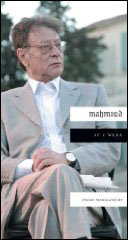 For me, the most memorable of Darwish’s work will always remain his seminal poem, ‘Madeeh al-Thill al-’Aaly’ (In Praise of the High Shadow). The poem was written on the deck of one of the ships carrying Darwish, along with thousands of Palestinian fighters, from Beirut to Tunisia after Israel’s barbaric destruction of Lebanon in 1982. Darwish recounts the daily realities of living under shelling and under siege in Beirut, the deafening silence of the rest of the world towards the plight of the Palestinians and Lebanese, and the harrowing details of the Sabra and Shatila massacre. Acerbic, witty and powerful, Darwish skewers everyone from the Israeli government murdering civilians while pretending to be the victim (‘You stole our tears, wolf’), to the American government (‘The Plague’) giving every child a cluster bomb toy as a gift, to the Arab governments (‘the bastard nations’). Yet through it all, and as dark as the plight becomes, Darwish never loses sight of the humanism at the heart of his cause and at the heart of the Palestinian struggle. He continuously disparages nationalism and mocks its silliness. The ending of the poem, in particular, serves as a sort of Palestinian anti-Zionist humanist manifesto. In it, Darwish addresses the Palestinian fighter with powerful rhetorical questions, asking him about the true nature of his cause, and what he is really after. Mocking the trappings of nationalism and statehood, Darwish – in no uncertain terms – asserts that the cause has always been about humans, about freedom from oppression, about the revolution against persecution, about the ideals of liberty, and not about nationalism and the toys of statehood.
For me, the most memorable of Darwish’s work will always remain his seminal poem, ‘Madeeh al-Thill al-’Aaly’ (In Praise of the High Shadow). The poem was written on the deck of one of the ships carrying Darwish, along with thousands of Palestinian fighters, from Beirut to Tunisia after Israel’s barbaric destruction of Lebanon in 1982. Darwish recounts the daily realities of living under shelling and under siege in Beirut, the deafening silence of the rest of the world towards the plight of the Palestinians and Lebanese, and the harrowing details of the Sabra and Shatila massacre. Acerbic, witty and powerful, Darwish skewers everyone from the Israeli government murdering civilians while pretending to be the victim (‘You stole our tears, wolf’), to the American government (‘The Plague’) giving every child a cluster bomb toy as a gift, to the Arab governments (‘the bastard nations’). Yet through it all, and as dark as the plight becomes, Darwish never loses sight of the humanism at the heart of his cause and at the heart of the Palestinian struggle. He continuously disparages nationalism and mocks its silliness. The ending of the poem, in particular, serves as a sort of Palestinian anti-Zionist humanist manifesto. In it, Darwish addresses the Palestinian fighter with powerful rhetorical questions, asking him about the true nature of his cause, and what he is really after. Mocking the trappings of nationalism and statehood, Darwish – in no uncertain terms – asserts that the cause has always been about humans, about freedom from oppression, about the revolution against persecution, about the ideals of liberty, and not about nationalism and the toys of statehood.
In Praise of the High Shadow
It is for you to be, or not to be,
It is for you to create, or not to create.
All existential questions, behind your shadow, are a farce,
And the universe is your small notebook, and you are its creator.
So write in it the paradise of genesis,
Or do not write it,
You, you are the question.
What do you want?
As you march from a legend, to a legend?
A flag?
What good have flags ever done?
Have they ever protected a city from the shrapnel of a bomb?
What do you want?
A newspaper?
Would the papers ever hatch a bird, or weave a grain?
What do you want?
Police?
Do the police know where the small earth will get impregnated from the coming winds?
What do you want?
Sovereignty over ashes?
While you are the master of our soul; the master of our ever-changing existence?
So leave,
For the place is not yours, nor are the garbage thrones.
You are the freedom of creation,
You are the creator of the roads,
And you are the anti-thesis of this era.
And leave,
Poor, like a prayer,
Barefoot, like a river in the path of rocks,
And delayed, like a clove.
You, you are the question.
So leave to yourself,
For you are larger than people’s countries,
Larger than the space of the guillotine.
So leave to yourself,
Resigned to the wisdom of your heart,
Shrugging off the big cities, and the drawn sky,
And building an earth under your hand’s palm – a tent, an idea, or a grain.
So head to Golgotha,
And climb with me,
To return to the homeless soul its beginning.
What do you want?
For you are the master of our soul,
The master of our ever-changing existence.
You are the master of the ember,
The master of the flame.
How large the revolution,
How narrow the journey,
How grand the idea,
How small the state!
An excerpt from the poem by Mahmoud Darwish
Translated by Saifedean Ammous
www.electronicintifada.net